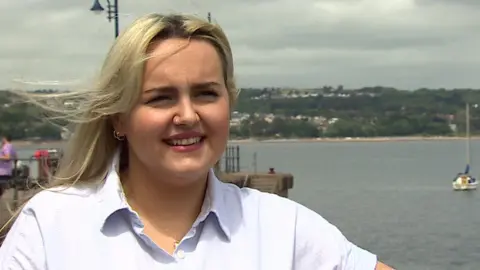Brain drain: You've got your degree - but do you stay in Wales?
 Getty Images
Getty ImagesMore needs to be done to help students in Wales stay after graduation, says a campaigner to stop 'a brain drain'.
It comes after comments made by First Minister Mark Drakeford signalling it was one of his priorities.
But Theo Davies-Lewis, who co-founded a network to enhance graduate opportunities in Wales, said ministers were not being proactive enough.
The Welsh government said it wanted to "ensure young people can live, study and work in Wales".
 FAMILY PHOTO
FAMILY PHOTOMr Davies-Lewis, who set-up the Darogan Talent network, told BBC Wales: "We've seen successive governments in the devolved area of Wales not really realising, or not being proactive as they could be.
"Now we're at an inflexion point in this pandemic, and there's a real opportunity, like there is amongst so many sectors, to actually manage it.
"That's what we need to do, and that's what the first minister should be doing over the next few years."
Figures published last year by the Higher Education Statistics Agency show that there were nearly 20% fewer students who graduated in 2017-18 in Wales on salaries over £30,000 compared with those who graduated in England.
The statistics also showed 30% of Welsh graduates were earning under £21,000 - while it was just 24% for those in England.
Data from the Office for National Statistics also shows that in 2019, 39.4% of those from Wales who were graduates were in non-graduate jobs - while it was slightly fewer for England - at 35.3%

'Salary ceiling'

Robyn Trubey is a recent graduate from Swansea, who is moving to London this summer to start her first graduate job.
She said: "There's not much room for progression to be successful in Swansea, you have to be luckily, and unless you hit the nail on the head it can be difficult without support, or if your parents have something you can go into.
"In 10 years' time, I'll probably be grateful that I've made the jump, because my earning will be a lot bigger than they would in Swansea. I feel like there's a ceiling here."
Leigh Hughes, who chairs the Cardiff Capital Region Skills Partnership, said he believed the graduate issue for Wales was slowly improving.
"What we have to do is listen to graduates, listen to the learners and where they are, and ask them what they're looking for, and what are their career opportunities and lifestyles," he argued.
"What we've seen recently is actually we're starting to attract people that have done their degrees elsewhere into Wales."
A Welsh government official said Wales was a net importer of students from the rest of the UK.
"We want to continue to attract gifted graduates to continue their studies here, which is why we have introduced a bursary scheme specifically for students undertaking a Master's degree in Wales in STEMM (science, technology, engineering, mathematics, and medicine) subjects or through the medium of Welsh, along with a generous postgraduate study finance package."
You can see more on the story on BBC Politics Wales on Sunday, 20 June at 10:00 BST on BBC One Wales, or on the iPlayer.